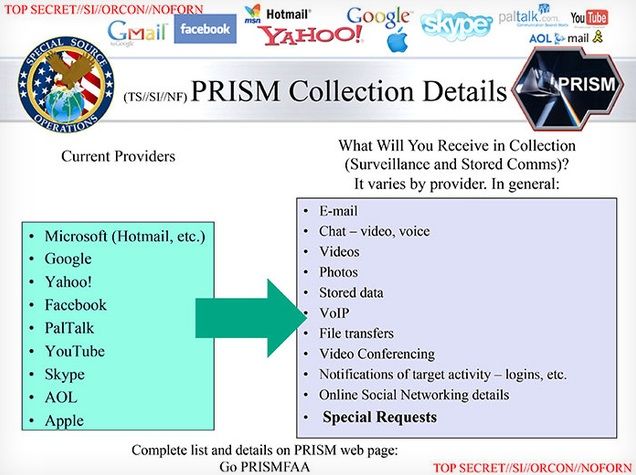
Google, Apple, Facebook, Microsoft, Yahoo and AOL have all signed an open letter expressing support for the USA Freedom Act co-sponsored by Democrat Senator Patrick Leahy and Republican Representative Jim Sensenbrenner. The Act, if passed, would outlaw the NSA’s speculative bulk collection of data and allow the companies to be far more transparent about the data they are obliged to make available to the government.
As companies whose services are used by hundreds of millions of people around the world, we welcome the debate about how to protect both national security and privacy interests and we applaud the sponsors of the USA Freedom Act for making an important contribution to this discussion.
The companies had previously complained that gag orders forced them to issue denials that were technically true but misleading. They had asked to be allowed to release more specific figures about the number of demands they receive for personal data.
This letter goes further, in supporting moves to actually limit the powers the government would have to gain access to the data in the first place.
Transparency is a critical first step to an informed public debate, but it is clear that more needs to be done. Our companies believe that government surveillance practices should also be reformed to include substantial enhancements to privacy protections and appropriate oversight and accountability mechanisms for those programs.
In introducing the bill, Senator Leahy said “The government surveillance programs conducted under the Foreign Surveillance Intelligence Act are far broader than the American people previously understood. Modest transparency and oversight provisions are not enough.”
The Verge reports that Google is tightening the security of its internal networks, and that Twitter has already moved to encrypt direct messages.
Full text of the open letter below.

October 31, 2013
The Honorable Patrick J. Leahy
Chairman, Committee on the Judiciary
United States Senate
224 Dirksen Senate Office Building
Washington, DC 20510
The Honorable Michael S. Lee
Member, Committee on the Judiciary
United States Senate
316 Hart Senate Office Building
Washington, DC 20510
The Honorable John Conyers, Jr.
Ranking Member, Committee on the Judiciary
U.S. House of Representatives
2138 Rayburn House Office Building
Washington, DC 20515
The Honorable Frank James Sensenbrenner, Jr.
Member, Committee on the Judiciary
U.S. House of Representatives
2449 Rayburn House Office Building
Washington, DC 20510
Dear Messrs. Chairman, Ranking Members and Members:
As companies whose services are used by hundreds of millions of people around the world, we welcome the debate about how to protect both national security and privacy interests and we applaud the sponsors of the USA Freedom Act for making an important contribution to this discussion.
Recent disclosures regarding surveillance activity raise important concerns both in the United States and abroad. The volume and complexity of the information that has been disclosed in recent months has created significant confusion here and around the world, making it more difficult to identify appropriate policy prescriptions. Our companies have consistently made clear that we only respond to legal demands for customer and user information that are targeted and specific. Allowing companies to be transparent about the number and nature of requests will help the public better understand the facts about the government’s authority to compel technology companies to disclose user data and how technology companies respond to the targeted legal demands we receive. Transparency in this regard will also help to counter erroneous reports that we permit intelligence agencies “direct access” to our companies’ servers or that we are participants in a bulk Internet records collection program
Transparency is a critical first step to an informed public debate, but it is clear that more needs to be done. Our companies believe that government surveillance practices should also be reformed to include substantial enhancements to privacy protections and appropriate oversight and accountability mechanisms for those programs.
We also continue to encourage the Administration to increase its transparency efforts and allow us to release more information about the number and types of requests that we receive, so that the public debate on these issues can be informed by facts about how these programs operate. We urge the Administration to work with Congress in addressing these critical reforms that would provide much needed transparency and help rebuild the trust of Internet users around the world.
We look forward to working with you, the co-sponsors of your bills, and other members on legislation that takes into account the need of governments to keep individuals around the world safe as well as the legitimate privacy interests of our users around the world.








